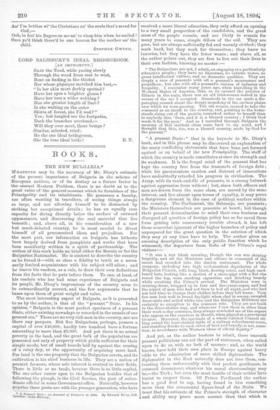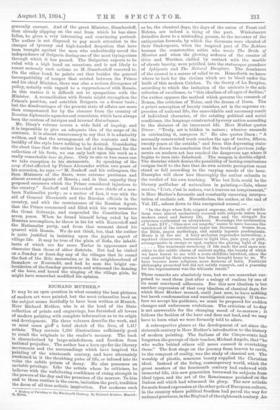BOOKS.
THE NEW BULGARIA.* WHATEVER may be the accuracy of Mr. Dicey's estimate of the present importance of Bulgaria in the scheme of European nations, or of its destiny as a future factor in the eternal Eastern Problem, there is no doubt as to the great value of the general account which he furnishes of the Principality and its inhabitants. He possesses a faculty, too often wanting in travellers, of seeing things always en large, and not allowing himself to be distracted by striking but exceptional details ; he has an equally rare -capacity for diving directly below the surface of outward appearances, and discovering the real material that lies beneath ; and, above all, in his consideration of a new but much-debated country, he is most careful to divest himself of all preconceived ideas and prejudices. For the most part, our information on Bulgaria has hitherto been largely derived from pamphlets and works that have been manifestly written in a spirit of partisanship. The author of this work holds no brief either for Russia or for the Bulgarian Nationalist. He is content to describe the country as he found it—with as close a fidelity to truth as a neces- sarily limited acquaintance with his subject will allow; and he leaves his readers, as a rule, to draw their own deductions from the facts that he puts before them. To one, at least, of his readers who has had some experience of Bulgaria and its people, Mr. Dicey's impressions of the country seem to be extraordinarily correct, and the few arguments that he bases upon them of great weight and value.
The most interesting aspect of Bulgaria, as it is presented to us by the author, is that of the " peasant " State. In his opinion, " Bulgaria is the most perfect specimen of a peasant State, either existing nowadays or recorded in the annals of our present era." There are no very rich men in the country, nor are there any paupers. Not five Bulgarians, perhaps, possess a capital of over £40,000; hardly two hundred have a fortune amounting to more than 25,000. And yet there is no actual poverty in the land, and the great bulk of the population are possessed not only of property which yields sufficient for their simple needs, but of small hoards laid by against the coming of a rainy day, or the opportunity of acquiring more land. For land is the one property that the Bulgarian covets, and its cultivation is his chief business in life. They are a nation of peasant farmers, whose sole interest is centred in their fields. There is little or no trade, because there is so little capital. The one other career open to the Bulgarian besides that of following the plough, is the Civil Service, the post of subor- dinate official in some Government office. Naturally, however popular these posts are with the younger generation, who have * A Peaaant State an Acoount of Butgaria in 1894. By Edward Dicey, C.B. Landon: John Murray. received a more liberal education, they only afford an opening to a very small proportion of the candidates, and the great mass of the people remain, and are likely to remain for many years to come, simple tillers of the soil. They are poor, but are always sufficiently fed and warmly clothed; they work hard, but they work for themselves ; they know no luxuries, but they have the fewer wants ; and above all, as the author points out, they are free to live out their lives in their own fashion, knowing no master :— 0 The Bulgarians are not, I admit, an engaging or a particularly attractive people ; they have no literature, no artistic tastes, no great intellectual culture, and no dramatic qualities. They are simvly a race of peasants with all a peasant's meannesses and prejudices ; but also with all a peasant's virtues of industry and frugality. I remember many years ago, when travelling in the Western States of America, that, as we crossed the prairies of Illinois in the train, there was an old Irishwoman seated in the corner of the car I occupied. Somebody in the car made a dis- paraging remark about the dreary monotony of the endless plains over which we were passing. The old woman seemed to take the comment as an insult to the country, and, pointing to the home- steads rising out of the prairie, remarked rather to herself than to anybody else, Sure, and it is a blessed country ; I think God made it for the poor.' And as I travelled through Bulgaria the memory of this incident often came back to my mind, and I thought that this, too, was a blessed country, made by God for the peasant."
"A peasant State :" that is the keynote to Mr. Dicey's book, and in this phrase may be discovered an explanation of the many conflicting statements that have been put forward against or on behalf of the new Principality. The stuff of which the country is made constitutes at once its strength and its weakness. It is the frugal mind of the peasant that has kept the country free from the trammels of foreign debt ; while his parsimonious caution and distrust of innovations have undoubtedly retarded his progress in civilisation. The Army, with its rank-and.file of peasants, is a strong bulwark against aggression from without; but, since both officers and men are drawn from the same class, are moved by the same interest, and live almost upon terms of equality, it may prove a dangerous element in the ease of political warfare within the country. The Parliament, the Sobranje, are peasants ; the Ministers themselves are peasants at heart; but though their peasant determination to mind their own business and disregard all question of foreign policy has so far saved them from getting into unnecessary trouble abroad, it has left them somewhat ignorant of the higher branches of policy and unprepared for the great question in the solution of which they may at any time have to help. The author gives an amusing description of the only public function which he witnessed, the departure from Sofia of the Prince's royal visitors :— "It was a raw bleak morning, though the sun was shining brightly, and all the Ministers and officers in command of the escort had crowded into the station restaurant. The whole company, including two high ecclesiastical dignitaries of the Bulgarian Church, with long, black, flowing robes, and high card- board hats, looking like a section of a stove-pipe with a flat rim round the top, were smoking cigarettes and drinking brandy while awaiting the Prince's arrival. The Ministers were in evening-dress, wrapped up in furs and Inverness-capes, and had the aspect of men who had not been to bed all night, and who bad not bad time to change their clothes before they left home. Very few men look well in broad daylight when clad in seamy, rumpled dress-suits and soiled white ties, and the Bulgarian Ministers are certainly no exception to the common rule. They are not built in the dress-clothes way, and whenever I saw them in other than their work-a-day costumes, they always reminded me of the supers whir appear as the courtiers in Hamlet, when played at a provincial theatre. Moreover, the spectacle of a whole Cabinet Council sit- ting round the beer-stained table of a railway refreshment-room, and standing drinks to each other of beer and brandy, is not, some- how, in accordance with Western ideas of official dignity."
And yet, as the author hastens to admit, these uncouth peasant politicians can act the part of statesmen, when called upon to do so, with no lack of manner ; and, as the world knows, have held their own place in Europe against heavy odds to the admiration of more skilled diplomatists. The diplomatist in the East naturally does not love them, con- trasting them unfavourably with that perfect gentleman, in outward demeanour, whatever his moral shortcomings may be,—the Turk ; but even the most hostile of their critics have learnt to respect them. Of Prince Ferdinand the author has a good deal to say, having found in him something more than the ornamental figure-head of the State. We trust that his estimate of the Prince's strength of character and ability may prove more correct than that which is generally current. And of the great Minister, Stambouloff, then already slipping on the seat from which he has since fallen, he gives a very interesting and convincing portrait. The author is not disposed to pay much attention to the charges of tyranny and high-handed despotism that have been brought against the man who undoubtedly saved the independence of Bulgaria during one of the most trying crises through which it has passed. The Bulgarian expects to be ruled with a high hand on occasions, and is not likely to resent seriously such actions as M. Stambouloff resorted to. On the other hand, he points out that besides the general incompatibility of temper that existed between the Prince and his chief Minister, there was also a serious divergence of policy, notably with regard to a rapprochement with Russia. In this matter it is difficult not to sympathise with the Minister. A reconciliation with Russia might strengthen the Prince's position, and establish Bulgaria on a firmer basis ; but the disadvantages of the present state of affairs are more than compensated for by the absence from the country of Russian diplomatic agencies and consulates, which have always been the centres of intrigue and internal disturbance. Mr. Dicey's volume covers a wide field of inquiry, and it is impossible to give an adequate idea of the scope of its contents. It is almost unnecessary to say that it is admirably written, and that the arrangement of the contents and the lucidity of the style leave nothing to be desired. Considering the short time that the author has had at his disposal for the collection of his facts, we can only look upon his work as a really remarkable tow de force. Only in one or two oases can we take exception to his statements. In speaking of the coup cl'6tat effected by Prince Alexander within two years of his accession, he says :—" M. Zankoff and his colleagues, the then Ministers of the State, were extreme partisans and almost avowed agents of Russia ; and in that capacity they proposed measures which the Prince considered injurious to the country." Zankoff and Karaveloff were chiefs of a new- born Nationalist party; as a matter of fact, it was with the aid of General Ehrenroth and the Russian officials in the country, and with the countenance of the Russian Agent, that the Prince summoned and filled with his own nominees the Great Sobranje, and suspended the Constitution for seven years. When he found himself being ruled by his Russian accomplices, he threw in his lot with Karaveloff and the Nationalist party, and from that moment dated his quarrel with Russia. We do not think, too, that the author is quite justified in insisting upon the joyless aspect of village life. It may be true of the plain of Sofia, the inhabi- tants of which are far more Tartar in appearance and character than those of other districts. But had he visited on a Sunday or feast-day any of the villages that lie round the feet of the Rilo mountains, or in the neighbourhood of Samakow or Kustendil, and had he seen the bright em- broideries of the Sunday garments, and witnessed the dancing of the hora, and heard the singing of the village girls, he might have somewhat modified his opinion.



































 Previous page
Previous page